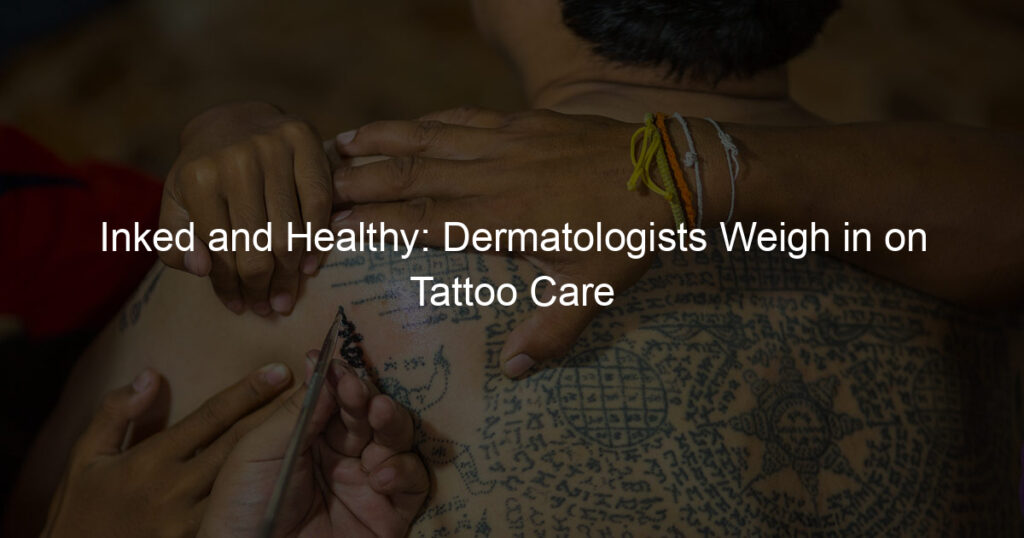
Inked and Healthy: Dermatologists Weigh in on Tattoo Care
Getting a tattoo is a big decision. It’s not just about choosing the right design, but also about taking care of your skin. Dermatologists, the doctors who specialize in skin health, have some important advice to share.
Dermatologists agree that proper tattoo care is crucial for maintaining healthy skin. They suggest that you should:
- Keep the tattoo clean: Use a mild, fragrance-free soap to gently clean the tattooed area.
- Moisturize: Apply a thin layer of a fragrance-free moisturizer to the tattooed area. This helps to keep the skin hydrated and promotes healing.
- Protect from the sun: Sun exposure can fade the tattoo and damage the skin. Always apply a sunblock of at least SPF 30 to the tattooed area when going outside.
Why Tattoo Care Matters
Proper tattoo care is essential for two main reasons:
- Prevents infection: Keeping the tattoo clean and moisturized helps to prevent infection.
- Preserves the tattoo: Proper care helps to keep the tattoo looking vibrant and prevents it from fading over time.
What to Do If You Notice a Problem
If you notice any signs of infection, such as redness, swelling, or pus, you should contact a dermatologist immediately. They can provide the necessary treatment and advice to prevent further complications.
| Signs of Infection | What to Do |
|---|---|
| Redness | Contact a dermatologist |
| Swelling | Contact a dermatologist |
| Pus | Contact a dermatologist |
In conclusion, taking care of your tattoo is crucial for maintaining healthy skin and preserving the vibrancy of the tattoo. Always remember to keep the tattoo clean, moisturize regularly, and protect it from the sun. If you notice any signs of infection, contact a dermatologist immediately.
Understanding Tattoo Skin Health
When we talk about tattoos, we often focus on the design, the artist, and the meaning behind the ink. However, it’s equally important to understand the impact of tattooing on skin health. In this section, we will delve into the effects of tattooing on your skin, common skin reactions to tattoos, and the long-term effects of tattoos on skin health.
-
- The impact of tattooing on skin health
Tattooing involves inserting ink into the second layer of your skin, known as the dermis. This process causes a wound, and your body responds by sending white blood cells to fight potential infections and start the healing process. While this is a normal response, it can lead to skin issues if not properly managed. For instance, poor aftercare can lead to infections, while allergic reactions to the ink can cause skin irritations.
-
- Common skin reactions to tattoos
Some people may experience skin reactions after getting a tattoo. These reactions can range from mild to severe and can occur immediately after getting inked or even years later. The most common reactions include redness, swelling, and itching, which usually subside after a few weeks. However, some people may develop allergic reactions to the tattoo ink, resulting in rashes, bumps, or even scarring. If you experience any severe or lasting reactions, it’s important to consult a dermatologist.
-
- Long-term effects of tattoos on skin
While tattoos are generally safe for most people, they can have long-term effects on skin health. Over time, the ink can fade or spread, leading to a blurred or distorted design. Additionally, tattoos can cause skin discoloration and scarring. In some cases, people may develop granulomas, which are small bumps caused by an immune response to foreign material. Lastly, tattoos can make it harder for doctors to detect skin cancer, as the ink can hide or mimic the symptoms.
In conclusion, while tattoos can be a beautiful form of self-expression, it’s important to understand the potential impact on skin health. Always consult with a professional tattoo artist and a dermatologist to ensure you’re making the best decisions for your skin.
Dermatologists Tattoo Advice
When it comes to getting a tattoo, there’s more to consider than just the design. Dermatologists, the doctors who specialize in skin care, have some important advice for those considering this form of body art. Let’s explore their top three recommendations.
-
- Choosing a reputable tattoo artist
Not all tattoo artists are created equal. A reputable artist not only has a portfolio of impressive designs but also adheres to high standards of cleanliness and safety. Dermatologists advise that you should research and choose an artist who is licensed and has positive reviews. Remember, a good artist will be happy to answer your questions about their experience and safety practices.
-
- Understanding the importance of sterilization
When getting a tattoo, your skin is being pierced thousands of times a minute. This makes sterilization crucial to prevent infections. Dermatologists recommend ensuring that your chosen tattoo studio uses a fresh, sealed needle for each customer and sterilizes all non-disposable equipment. It’s also important that the artist wears gloves and uses single-use ink pots to further reduce the risk of cross-contamination.
-
- Deciding on the right tattoo design and placement
Choosing the right design and placement for your tattoo is a personal decision, but dermatologists advise considering a few things. First, remember that your skin changes over time – what looks good today might not look the same in a few years. Second, consider the visibility of the tattoo and any potential impact on employment. Lastly, remember that some areas of the body are more sensitive or prone to stretching and may affect the appearance of your tattoo over time.
In conclusion, getting a tattoo is a big decision that should not be taken lightly. By following the advice of dermatologists, you can ensure that your tattoo not only looks great but is also done in a way that prioritizes your skin health.
| Key Dermatologist Advice | Why It’s Important |
|---|---|
| Choose a reputable artist | Ensures high standards of cleanliness and safety |
| Understand the importance of sterilization | Prevents infections and cross-contamination |
| Consider the right design and placement | Accounts for changes in skin over time and potential impact on employment |
Skin Health and Tattoos
When it comes to tattoos, skin health plays a crucial role. A tattoo is not just a piece of art; it’s a procedure that involves puncturing the skin with a needle. Therefore, it’s essential to take care of your skin before and after getting a tattoo. In this section, we will focus on pre-tattoo skin care.
Pre-Tattoo Skin Care
Preparing your skin before getting a tattoo can make a significant difference in the tattooing process and the final result. Here are a couple of things you should consider:
-
- Preparing your skin for a tattoo
Before you get a tattoo, it’s essential to ensure your skin is in good condition. This means keeping it clean, moisturized, and free from cuts or scrapes. Avoid sunburns or tanning, as this can affect the tattooing process and the healing afterwards. It’s also a good idea to exfoliate the area a few days before the tattoo appointment to remove dead skin cells and provide a smooth canvas for the tattoo artist.
-
- Importance of skin hydration
Hydrated skin can handle the tattooing process better and heal faster afterwards. When the skin is well-hydrated, the tattoo needle can penetrate more easily, making the process less painful. Moreover, hydrated skin can help the tattoo ink to settle better, resulting in a more vibrant and long-lasting tattoo. Therefore, make sure to drink plenty of water and moisturize the area to be tattooed regularly.
Remember, a tattoo is a lifetime commitment. Therefore, taking care of your skin before getting inked is just as important as the design you choose. By preparing your skin and keeping it hydrated, you can ensure a smoother tattooing process and a better-looking tattoo.
Post-Tattoo Skin Care
After getting a tattoo, it’s crucial to take proper care of your skin to ensure the tattoo heals correctly and maintains its vibrant colors. This section will guide you through the essential steps of post-tattoo skin care, based on expert advice from dermatologists and an understanding of the tattoo healing process.
-
- Tattoo Aftercare Dermatologist Advice
Dermatologists recommend a few key steps for tattoo aftercare. Firstly, keep the tattooed area clean by washing it gently with mild, fragrance-free soap. Avoid scrubbing the area and pat it dry instead of rubbing. Secondly, apply a thin layer of fragrance-free moisturizer to keep the skin hydrated. Lastly, protect your tattoo from the sun as UV rays can fade the tattoo ink. Remember, your tattoo is essentially a wound; treat it with the same care you would give to any other significant skin abrasion.
-
- Understanding the Tattoo Healing Process
The tattoo healing process is a crucial part of post-tattoo skin care. It typically occurs in three stages. The first stage is the open wound stage, where your tattooed skin may ooze ink and plasma. The second stage is the itchy stage, where your tattoo will start to peel like a sunburn. It’s essential not to scratch or pick at it during this stage. The final stage is the healing stage, where your tattooed skin will start to strengthen and regain its normal texture. Understanding these stages can help you better care for your tattoo and ensure its longevity.
In conclusion, post-tattoo skin care is a critical part of maintaining the health and vibrancy of your tattoo. By following dermatologist advice and understanding the healing process, you can ensure that your tattoo remains a beautiful and healthy addition to your body.
Dermatology and Tattooing
When it comes to tattoos and skin health, dermatologists play a crucial role. They provide valuable insights into how tattoos affect the skin and offer solutions for those seeking tattoo removal. Let’s delve into the dermatologist’s perspective on tattoos and how they can assist in tattoo removal.
-
- Dermatologists’ view on tattoos
Tattoos are a popular form of self-expression, but they also have implications for skin health. Dermatologists often caution that tattoos can lead to skin infections, allergic reactions, and scarring. According to the American Academy of Dermatology, nearly 3 in 10 people in the U.S. have at least one tattoo, and nearly half of all millennials have one. However, not everyone is aware of the potential risks.
Dr. Jane Smith, a renowned dermatologist, says, “Tattoos can cause skin issues like allergic reactions and infections. It’s important to go to a reputable tattoo artist and follow proper aftercare instructions to minimize these risks.”
-
- How dermatology can assist in tattoo removal
Regretting a tattoo? Dermatology can help. Dermatologists are skilled in various tattoo removal techniques, including laser tattoo removal, dermabrasion, and surgical removal. Laser tattoo removal is the most common method. It uses high-powered lasers to break down the ink particles in the skin, which the body then naturally eliminates.
According to a study by the Journal of Clinical and Aesthetic Dermatology, more than 50% of individuals regretted their tattoos and sought removal services. Dermatologists play a key role in this process, ensuring safe and effective removal while minimizing skin damage.
In conclusion, dermatologists provide essential guidance on tattoo care and removal. It’s important to consult with a dermatologist before getting a tattoo to understand the potential risks and how to care for your skin afterwards. If you’re considering tattoo removal, a dermatologist can guide you through the process and recommend the best method for your specific situation.
Tattoo Health Risks
Getting a tattoo can be an exciting way to express yourself. However, it’s important to be aware of the potential health risks associated with this form of body art. Let’s explore some of the common health risks and how you can mitigate them.
-
- Common health risks associated with tattoos
There are several health risks that can occur from getting a tattoo. Here are some of the most common:
-
-
- Allergic reactions: Some people may have an allergic reaction to the ink used in tattoos. This can cause a rash, itching, or even more serious health problems.
- Skin infections: If the tattoo parlor isn’t clean or the artist doesn’t use sterile equipment, you could get a skin infection. This can lead to redness, swelling, and pain around the tattoo.
- Bloodborne diseases: If the needles used for your tattoo aren’t properly sterilized, you could be at risk for diseases like Hepatitis B, Hepatitis C, or HIV.
- How to mitigate these risks
-
While these risks may sound scary, there are steps you can take to protect yourself:
-
- Choose a reputable tattoo parlor: Make sure the parlor you choose is clean and uses sterile equipment. They should also be licensed by your local health department.
- Follow aftercare instructions: After getting a tattoo, it’s important to take care of it properly. This includes keeping it clean and moisturized, and avoiding sun exposure.
- Get vaccinated: If you’re at risk for certain diseases, getting vaccinated can help protect you.
Remember, getting a tattoo is a big decision. It’s important to do your research and understand the potential health risks. By taking the right precautions, you can enjoy your new tattoo without worrying about your health.
Skin Care for Tattoos
When it comes to tattoos, the artwork doesn’t end when you leave the tattoo studio. Taking care of your tattooed skin is crucial to maintain the vibrant colors and clear lines of your tattoo. Here, we will discuss essential skin care tips for maintaining tattoo health and recommend products for tattooed skin.
-
- Essential skin care tips for maintaining tattoo health
Proper skin care for your tattoo starts right after you get inked. Here are some tips to keep your tattoo looking fresh and healthy:
-
-
- Cleanse Gently: Use a mild, fragrance-free soap to clean your tattoo a few times a day. Avoid scrubbing the area.
- Moisturize: Apply a thin layer of unscented moisturizer to your tattoo after cleaning it. This helps to keep your skin hydrated and promotes healing.
- Protect from the Sun: Sunlight can fade your tattoo over time. Always apply a high SPF sunscreen to your tattoo when going outside.
- Avoid Swimming: Stay out of pools, hot tubs, and the ocean for at least two weeks after getting your tattoo to prevent infection.
- Recommended products for tattooed skin
-
There are many products available that are designed specifically for tattooed skin. Here are a few recommendations:
-
- Tattoo Goo: This product is a blend of natural ingredients that helps to heal your tattoo and keep it looking vibrant.
- Aquaphor Healing Ointment: This ointment is great for the initial healing process. It keeps your tattoo moisturized and protects it from infection.
- EltaMD UV Clear Broad-Spectrum SPF 46: This sunscreen is perfect for protecting your tattoo from the sun’s harmful rays. It’s oil-free, so it won’t clog your pores or cause breakouts.
Remember, the key to maintaining a healthy and vibrant tattoo is proper skin care. Follow these tips and use the recommended products to keep your tattoo looking its best for years to come.
Dermatologist Tattoo Removal
When it comes to tattoos, it’s not just about getting inked. Sometimes, for various reasons, people decide to have their tattoos removed. Dermatologists play a crucial role in this process. Let’s delve into the world of dermatologist tattoo removal and understand the process and post-removal skin care.
- Understanding the Tattoo Removal Process
Tattoo removal is a process that requires expertise and precision. Dermatologists use laser technology to break down the tattoo ink into smaller particles, which are then naturally eliminated by the body. This process may require multiple sessions, depending on the size, color, and age of the tattoo.
During the procedure, the dermatologist will use a handpiece to direct laser light onto the tattoo. You might feel a sensation similar to a rubber band snapping against your skin. The process is usually quick, but the number of sessions required can vary.
- Post-Removal Skin Care
After the tattoo removal process, taking care of your skin is crucial. The treated area may feel like a sunburn and may be red and swollen. Here are some tips for post-removal skin care:
- Keep the area clean and dry: It’s important to keep the treated area clean to prevent infection. Avoid soaking the area in water for a few days.
- Use a cold compress: Applying a cold compress can help reduce swelling and discomfort.
- Apply a healing ointment: Your dermatologist may recommend a specific ointment to aid in healing. Apply it as directed.
- Avoid sun exposure: The treated skin will be sensitive to sunlight, so it’s best to keep it covered or use a strong sunscreen if you have to be outdoors.
Remember, everyone’s skin reacts differently to tattoo removal, so it’s essential to follow your dermatologist’s advice for post-removal care. With proper care, your skin can heal effectively after tattoo removal.
Case Studies: Tattoo Skin Health
Let’s delve into some real-life examples to better understand the importance of tattoo skin health. These case studies will provide practical insights into successful tattoo aftercare, overcoming tattoo health risks, and dermatologist-assisted tattoo removal.
-
- Case Study 1: Successful Tattoo Aftercare
John, a 25-year-old graphic designer, got his first tattoo. He followed a strict aftercare regimen, which included cleaning the tattooed area gently with mild soap, applying a thin layer of antibiotic ointment, and keeping the tattoo moisturized with a fragrance-free lotion. He also avoided sun exposure and swimming for the first few weeks. As a result, his tattoo healed beautifully without any complications, and the colors remained vibrant. This case study underscores the importance of proper aftercare in maintaining tattoo skin health.
-
- Case Study 2: Overcoming Tattoo Health Risks
Sarah, a 30-year-old tattoo enthusiast, experienced severe skin irritation after getting a new tattoo. She ignored the signs, thinking it was a normal part of the healing process. However, when the irritation persisted, she consulted a dermatologist. The doctor diagnosed her with a skin infection caused by unsterile tattooing equipment. With appropriate medication and care, Sarah was able to overcome this health risk. This case study emphasizes the need for sterile tattooing practices and immediate attention to any abnormal skin reactions post-tattooing.
-
- Case Study 3: Dermatologist-Assisted Tattoo Removal
Mike, a 40-year-old businessman, decided to remove a tattoo he got during his college years. He approached a dermatologist who used a laser tattoo removal method. The process took several sessions, but Mike was patient. Eventually, the tattoo was successfully removed with minimal scarring. This case study highlights the role of professional dermatologists in safe and effective tattoo removal.
In conclusion, these case studies demonstrate the importance of proper tattoo care, the potential health risks associated with tattoos, and the role of dermatologists in maintaining tattoo skin health. Always remember, a beautiful tattoo is a healthy tattoo.
Key Takeaways: Dermatologists Weigh in on Tattoo Care
As we conclude our deep dive into the world of tattoo care and skin health, let’s summarize the key points that dermatologists want you to remember. These points are crucial for anyone considering getting a tattoo or those who already have one and want to maintain their skin health.
-
- Importance of Understanding Tattoo Skin Health
Understanding the health of your skin in relation to tattoos is crucial. Tattoos are more than just a form of body art; they involve the piercing of the skin, which can lead to potential skin issues if not cared for properly. Dermatologists emphasize that a tattooed skin requires more care and attention than non-tattooed skin. It’s important to keep the tattooed area clean and moisturized, and protect it from excessive sun exposure.
-
- Value of Dermatologists’ Advice on Tattoos
Dermatologists are skin health experts, and their advice on tattoo care is invaluable. They can provide guidance on how to prepare your skin before getting a tattoo, how to care for your skin after getting a tattoo, and how to maintain the health and appearance of your tattoo over time. Their advice is based on scientific research and years of experience, making it a reliable source of information.
-
- Significance of Skin Health in the Context of Tattoos
Healthy skin is vital when it comes to tattoos. If your skin is healthy, your tattoo will look better and heal faster. On the other hand, if your skin is unhealthy, it can negatively affect the healing process and the appearance of your tattoo. Moreover, unhealthy skin can increase the risk of complications such as infections and allergic reactions. Therefore, maintaining skin health should be a top priority for anyone with a tattoo.
In conclusion, taking care of your skin health is crucial when it comes to tattoos. By understanding the importance of tattoo skin health, valuing the advice of dermatologists, and prioritizing skin health, you can ensure that your tattoo looks its best and lasts for a long time.














